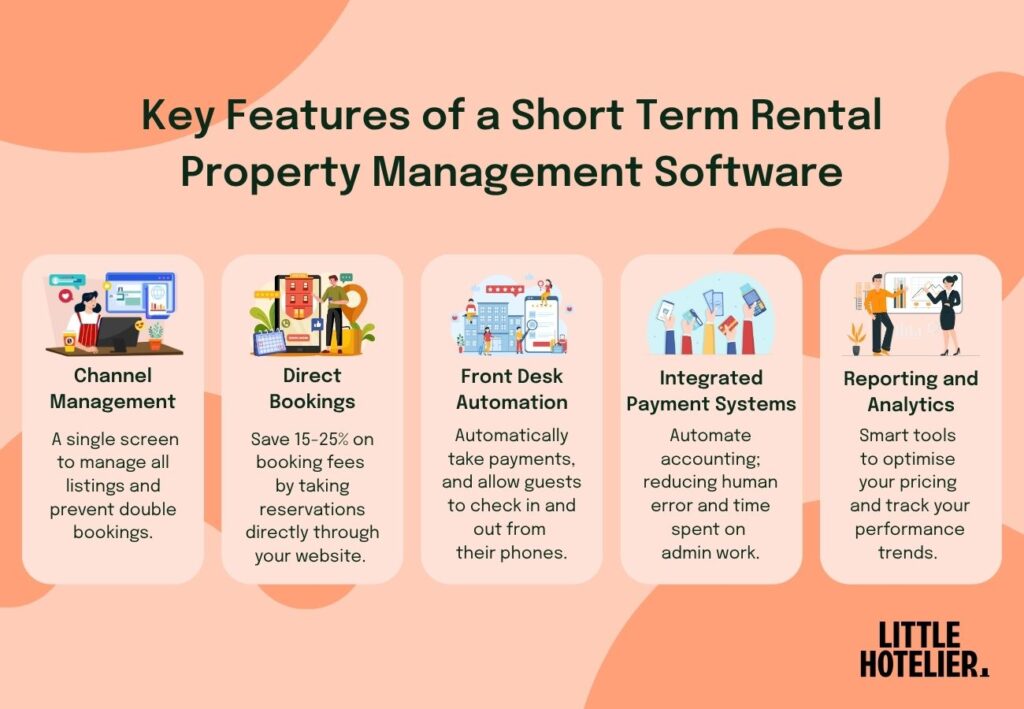What is short term rental property management?
Short term rental property management is the handling of bookings, cleaning, maintenance, pricing and communication for accommodation that is rented out for brief stays, be it a holiday home, a bed and breakfast or a boutique hotel.
This management is typically handled in-house, but can also be outsourced to third-party providers who charge short term rental property management fees (whether a flat rate or a percentage of booking value).
Property managers oversee marketing (professional photos, listings, dynamic pricing), guest services (check-in, check-out, 24/7 communication), and property care (housekeeping, linen, maintenance). They often use specialised short term rental property management software, which can help to maximise occupancy and optimise nightly rates.
For small hoteliers, property management extends beyond day-to-day operations, encompassing things like reputation management, regulatory compliance, and securing property management short term rental insurance.
Short term rental management and hotel management have plenty of overlap, but there are a few small differences between running a hotel versus a short term rental like an Airbnb or holiday home. Regardless of the type of accommodation you run, a strategic approach to short term property management allows you to work more efficiently, secure more bookings, and boost your profits.
Maximise your bookings with smarter pricing
Get daily pricing recommendations based on real-time market data, so you can spend less time on rates and more time on guests.
Learn about Dynamic Revenue PlusWhy is short term rental property management important for small hotels?
Short term rental property management is critical for your small hotel because it helps you to maximise occupancy, streamline operations and enhance the guest experience. It allows you to better compete for bookings against other hotels, as well as short-stay platforms like Airbnb.
Small hotels face a range of business challenges: fluctuating demand, ever-increasing guest expectations, and a short-term rental marketplace that has been transformed by platforms like Airbnb and Vrbo. With limited staff, independent operations are also often burdened with doing everything themselves.
Smart short term rental property management can make your hotel operations more efficient and adaptable. Smart management strategies powered by specialised tools can minimise mistakes, automate the busywork, and allow you to focus on high value tasks requiring a human touch e.g., enhancing the guest experience.
A focus on property management also ensures consistency. When you deliver a seamless check-in/out process, clean rooms and personalised communications, you earn repeat bookings and better reviews that attract new guests.
To summarise, short term rental property management:
- Maximises occupancy and competitiveness by helping small hotels stand out in a crowded market.
- Improves efficiency through automation, to reduce the workload placed on a small team.
- Enhances guest satisfaction with consistent service, leading to repeat bookings and better reviews.
What to look for in a short term rental property management software?
When choosing short term rental property management software, look for features that simplify operations, boost occupancy and enhance the guest experience. Key tools include channel management, automation, payment processing and reporting, as well as ease of use and reliable customer support.
The best software should help you handle the complexities of short-term rentals more efficiently in the following ways:

- Channel management: Control all your listings from a single dashboard to prevent double bookings. When a guest books on one platform, your availability should update across all connected channels including Booking.com, Airbnb, Expedia, and your direct website. Look for systems with mobile apps that let you manage reservations remotely, essential for when you’re away from the front desk. Ensure the system offers two-way synchronisation with your existing property management setup to avoid manual updates.
Understanding how PMS integrations work can help you evaluate different systems more effectively. - Direct bookings: Capture commission-free bookings through your website to save 15-25% in OTA fees. The booking engine should integrate seamlessly with your website and social media pages, with mobile-responsive design for quick guest bookings on any device. Look for systems that also connect with metasearch platforms like Google Hotel Ads, Trivago and TripAdvisor to increase direct traffic. Some solutions include website builders to help you create or optimise your site for better conversion rates.
- Front desk automation: Streamline daily operations with a central calendar that serves as your operations hub. This should handle reservations, check-ins, guest profiles and room availability in one place. Mobile access is crucial since you need to manage bookings whether you’re running errands or away from the property. Cloud-based systems ensure everything syncs instantly, giving you operational freedom. Look for platforms offering in-app support for quick assistance when needed.
- Integrated payment systems: Process payments seamlessly across your business to save several minutes per booking. Look for simplified payment modules that work on mobile devices, allowing you to handle transactions anywhere. The system should manage deposits, final payments and invoicing without requiring separate software. Security features like multi-factor authentication are essential when processing financial transactions. Integration with your accounting software eliminates duplicate data entry.
- Reporting and analytics: Access data dashboards that help optimise pricing and track performance across all channels. The system should identify your best-performing channels and highlight revenue opportunities through occupancy patterns and seasonal trends. Real-time reporting lets you make informed rate adjustments quickly, whether at your desk or on mobile. Look for insights that help you understand booking patterns and guest behaviour to maximise revenue per available room (RevPAR).
Ease of use is also critical, particularly for small, independent hotels where you are your own IT department. Choose a tool with a simple, user-friendly interface, and 24/7 access to a human support team.
Ideally your chosen tool will be built specifically for a business like yours: a small, independent hotel that takes care of short term rental property management in house.
Key takeaways
- Choose software with channel management, direct booking and automation features.
- Prioritise tools that help you to optimise pricing and streamline operations.
- Look for a purpose-built tool that is easy to use and offers strong customer support.
How can small hotel owners get started with short term rental property management?
If you’re looking to pivot your hotel or property towards the short term rental market, it’s great to start with an honest review of your current operations. Work to identify your existing management issues, and note opportunities to enhance the way you run your property.
Why focus on short-term rentals? Because this market is booming:
- Platforms like Airbnb and Vrbo are driving significant growth: annual revenue from short-term rentals is nearing US$100 billion globally, with double-digit growth forecast over the next few years.
- According to Precedence Research, the global short-term rental market is projected to reach $344 billion by 2034; growing 10.7% annually.
- Positioning your accommodation as a short term rental may boost bookings: In 2023 the average occupancy rate for vacation rentals worldwide was 58% vs 51% for traditional hotels.
- What’s more, 86% of travellers say they would book a vacation rental over a hotel for longer bookings of 7+ nights – the types of stay that offer financial stability to small hotels.
Let’s take a look at how a small, independent hotel can capitalise on the growing interest in short term rentals through smart property management.
1. Decide if short term rentals are right for you
Targeting the short term rental market can certainly boost revenue, but it’s not always the right choice for every property. Before diving in, consider whether the size, location and target audience of your hotel or property aligns with the existing market for short-term rentals.
Accommodation providers who target older guests, for example, may not get much more business through tech-centric short-term platforms like Airbnb and Vrbo. These channels also have a far greater focus on personalisation and unique guest experiences – selling points that take a level of work that some hotel owners may not be able to take on.
2. Understand management agreements and arrangements
The next step is to consider whether you’ll manage the property yourself, or outsource the responsibility. If you’re considering third-party management support, you’ll need a short term rental property management agreement.
Short term rental property management agreements are the contracts between property owners and property managers that outline the managerial responsibilities for handling the short-term rental property.
These agreements typically outline service scope, including guest communications, booking management, pricing strategy, financial reporting, cleaning and maintenance. They also cover key terms such as fees, contract duration, termination clauses and liability protections. A clear agreement is critical to establish responsibilities and avoid future disputes.
3. Set up a property management system
If you plan to handle short term rental property management yourself, the next step is to put systems in place.
A smart property management system (PMS) for short term rental accommodation will help you streamline bookings, payments and guest communications, through features like channel management, automation, and reporting.
Shop for a PMS built specifically for small, independent hotels; one that’s powerful and feature-packed yet easy to use.
4. List your property on booking sites
A channel manager is a particularly helpful tool in opening up your property to the short term rental market, as it allows you to control your listings across traditional OTAs and short-term rental platforms through a single screen.
On top of OTAs like Booking.com and Expedia, you can expand your reach by listing your rooms on Airbnb, Vrbo and other short term rental platforms. These sites don’t just let any hotels on – you need to offer the unique and personalised guest experiences the users of these platforms are looking for.
If you are permitted to join, make sure your listing stands out with high-quality photos, personality-laden descriptions and competitive pricing, particularly while you’re establishing a presence on the platform. Don’t forget to keep your availability calendar synced through your channel manager to avoid double bookings.
5. Plan for cleaning and turnovers
Fast, reliable cleaning and room resets are essential when hosting short term guests. Put clear processes in place for housekeeping, laundry and restocking amenities. A PMS with housekeeping automation can help coordinate schedules and ensure nothing is missed.
It’s also wise to automate check-in and check-out processes where possible. This not only saves you time, it can also enhance the guest experience, as they can check themselves in at their own leisure, and head straight to their room as soon as they arrive, with no need to wait around at the front desk.
5. Review performance and improve
Implementing your short term rental systems, processes and tech is a great start. But to achieve true success, you need to optimise these efforts moving forward.
Track key metrics to understand what is and isn’t working. Use reporting tools to identify trends and opportunities for the optimisation of everything from pricing, to occupancy rates, to your online reputation.
This last point is particularly important in the context of short term rental platforms, as they place a sharp focus on guest ratings and reviews. You should actively solicit reviews from happy guests, and display your brand personality and values in your review replies, which is particularly important if the review isn’t glowing.
6. Review your insurance coverage
If you’re running a short-term rental, you will need specialist insurance coverage that offers you protection against guest injuries, accidental damage, and loss of income if the property becomes unrentable. If you work with a property manager, meanwhile, you should take out property management short term rental insurance.
Short-term rental insurance can be slightly different to the broader commercial hospitality insurance that is typically taken out by hotels, and which can cover property damage, business interruptions, and public and employer liability. Hotels may also add cover for alcohol service or events, to align with their larger scale and higher guest turnover.
Carefully consider which is right for your situation, and take out a policy that covers you for all reasonable risks.
Key takeaways
- Assess your hotel and target audience to understand whether short term rentals are a good fit.
- Implement a property management system and list your property across OTAs and short-term platforms.
- Once the strategy is implemented, monitor and optimise your performance into the future.
What is the best short term rental property management software?
The best short term rental property management software depends on your property type, size and specific needs. For small, independent hotels, the best are those that are built for your unique needs: that offer all the functionality that a small hotel requires, are simple to implement and use, help maximise occupancy and streamline operations, and offer support when you need it.
Some of the most popular short term rental property management tools include:
- Hostaway: A comprehensive platform for channel management, automation and multi-property management.
- Lodgify: An easy-to-use system focused on direct bookings and website integration for short term accommodation providers.
- Guesty: A robust, enterprise-level tool with advanced automation, reporting and team management features.
- Little Hotelier: All-in-one solution that offers all the short term rental functionality that small accommodation providers like independent hotels and B&Bs could need.
But only one of these tools is built specifically for small, independent hotels: Little Hotelier.
By Juhlian Pimping
Juhlian is the SEO and Content Manager at Little Hotelier, the all-in-one hospitality software designed specifically for small accommodation providers like boutique hotels, B&Bs, guesthouses, and inns. With extensive experience creating impactful content in the SaaS space since 2018, he specializes in developing resources that help property owners take back control of their daily operations, boost direct bookings, and enhance guest experiences.
Table of contents
“Little Hotelier is professional and much appreciated. For a small hotel like ours, the ability to quickly change rates and availability is crucial.”
Owner, Soloqui in Zero Branco









Sean O’Neill,
Owner
Devereux Residences